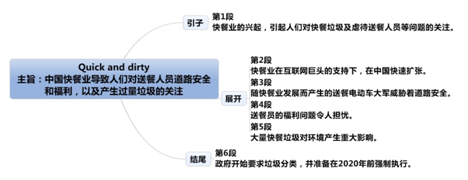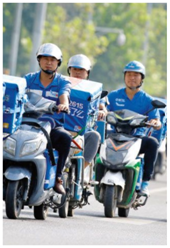Quick and dirty 快而脏的快餐

BEIJING 北京
Food delivery is a booming business. Waste is piling up, too
送餐是快速发展的行业,但同时产生了大量垃圾
THREE couriers[1] in hard helmets cram into[2] an office lift[3] in Beijing—one clad in[4] red, one in yellow and one in blue. The trio[5] are dispatching food that was purchased online through China’s most popular meal-ordering firms[6], which fill urban roads every midday[7] with their colourful delivery people[8] on electric bicycles. Delivery fees as low as three yuan ($0.46) have helped to transform urban lunch-hours[9]. But the booming[10] business is also fuelling concerns[11] about everything from waste to the abuse[12] of workers.
北京一处写字楼的电梯里挤进来三名戴着坚硬头盔的外卖小哥——他们分别穿着红色、黄色和蓝色的衣服。这三位小哥正在送外卖,而这些外卖是人们在中国最受欢迎的外卖网站上订购的。每天中午,这些外卖网站的小哥身穿不同颜色的衣服,骑着电动车,挤满了城市的大街小巷。低至三元(0.46美元)的送餐费帮助改变了城市里的午餐状况。但外卖行业的迅速发展也引起了人们对外卖垃圾、虐待从业人员等问题的担忧。

大大超载的快餐
[1] courier:快递员。这里指的是送餐员。
[2] cram into:挤进,勉强塞入,填满
[3] lift:电梯
[4] clad in:穿着
[5] trio:三人,三重唱,三人一组。
[6] meal-ordering firms:订餐公司,送餐公司
[7] midday:中午,正午。
[8] delivery people:送餐人员。
[9] Delivery fees as low as three yuan ($0.46) have helped to transform urban lunch-hours. 低达三元(0.46美元)的送餐费,让城市用餐时间变了个样。
[10] booming:兴旺的,繁荣的。
[11] concern:关注。
[12] abuse:虐待,滥用。
Such services—which enable users of a single site to order food from a swathe of[1] local restaurants—are expanding around the world. But in China the industry is on a tear[2]. By the end of June, the number of registered users had risen to 295m[3], 40% more than at the end of last year, according to government analysts. The value of meals bought online was about $25bn in 2016 and could rise to around $36bn by the end of next year, says iiMedia[4], a research firm. The market leaders are Meituan[5] and Ele.me[6]. Both still make losses in food delivery, but they have backing from Tencent and Alibaba respectively—tech giants eager to find ways of pushing customers to their duelling[7] online payment systems.
这种服务—可以让同一地点的用户从许多当地餐馆订餐—在全球都在扩张中。但在中国,这一行业炙手可热。截至6月底,其注册用户已达以2.95亿人,根据政府的分析,这一数字比去年底增加了40%。据调查公司艾媒咨询(iiMedia)报道,2016年,网上订餐金额约为250亿美元,今年底可能达到约36亿美元。送餐行业的市场领先公司是美团及饿了么,这两家公司目前仍在亏本送餐,但他们分别得到了腾讯和阿里巴巴—渴望让客户使用他们正在努力经营的网络支付系统的科技巨头—的支持。
[1] A swathe of:一长串,很多,众多。
[2] on a tear:炙手可热,很受欢迎。
[3] 295m = 2.95 million。这里的m是million的缩写,有时也用大写M。类似的缩写还有 k = kilo(千),b 或 bn = billion(十亿)。在电脑中,k、M、G、T分别是千、兆(百万)、吉(十亿)、特(万亿)。
[4] iiMedia = iiMedia Research:艾媒咨询。
艾媒咨询是全球领先的移动互联网第三方数据挖掘与整合营销机构,始步于2007年。是中国第一家专注于移动互联网、智能手机、平板电脑和电子商务等产业研究的权威机构;2012年,艾媒咨询正式成为国家统计局主管的中国市场信息调查业协会(CAMIR)唯一专注于移动互联网行业市场信息调研的成员单位。
[5] Meituan:美团。美团网[1] ,是2010年3月4日成立的团购网站。美团网有着“吃喝玩乐全都有”的宣传口号。总部位于北京市朝阳区望京东路6号。
[6] Ele.me:饿了么。是中国知名的在线外卖订餐平台,已覆盖中国数百个城市,数千万用户,聚集了数十万家餐饮商户。饿了么为中国广泛地区的用户提供丰富多样的便捷生活服务。
[7] duel:决斗,斗争。duelling:竞争激烈的,努力经营的。
Such businesses first began to take off[1] in student dormitories. These days young office-workers are by far the biggest market. But there is much hand-wringing[2] about the consequences of their popularity. Officials say the couriers threaten road safety. They ride electric bikes which are cheap, need no licence and are handy[3] in cities like Beijing that restrict the use of motorcycles. Delivery people often mount[4] pavements or drive against the flow of traffic to maximise[5] earnings during the lunchtime rush[6]. Last month officials in Nanjing said meal delivery bikes in the eastern city had been involved in more than 3,000 accidents in the first six months of the year. In one district of Shanghai police have introduced a penalty-points system. They order those who acquire a certain number of points to perform community service. The police can ask couriers’ employers to fire[7] them.
此类业务最初是在学生宿舍区发展起来的。但如今,年轻的办公室员工成为了其最大市场。但送餐流行的后果,却令人非常绝望。官方表示,送餐员威胁着道路安全。他们骑着无需牌照的廉价电动车,在北京这样限骑摩托车的城市里十分方便。送餐人员经常占用人行道或者逆流而行,以在午餐高峰期尽量提高收入。南京官方上个月表示,在今年前六个月中,南京东部城区的送餐车卷入了超过3,000起交通事故。在上海某些区,警方引入了罚点制度。警方命令那些得到一定罚点的人做社区服务,而且还可以要求送餐员的雇主解雇他们。
Another worry is the welfare of delivery people, many of whom are migrants from the countryside. In several ways they have it easier[8] than other types of courier: food boxes are easier to handle than bulky parcels, and the[1] take off:起飞,脱下,离开。这里理解成“发展”。
[2] hand-wringing:绝望,歇斯底里状态。
[3] handy:方便的,便利的,容易取得的。
[4] mount:登上(马、自行车、电动自行车等)。
[5] maximise:最大化,使……变得最大/最高。
[6] lunchtime rush:午餐高峰期。
[7] fire:解雇,开除。
[8] have it easier:过得舒服,处境很好,处于无忧无虑、轻松的境况,尤指与别人相比时显得轻松自在。这里指送餐的工作比送快递更轻松更舒服。
recipients are always there. But China Labour Bulletin[1], an NGO[2] in Hong Kong, says meal deliverers have been staging[3] growing numbers of protests about poor treatment by their employers (usually subcontractors), including wages paid late. Linking their pay to customer ratings[4] has also made it easy for customers to demand more of them than they should: the purchase of groceries enroute to their destinations, for example, or the disposal of household rubbish.
另一个担忧是送餐员的福利问题,很多送餐员都是来自农村的外来务工人员。相比于其他类型的快递工作,送餐工作有几个方面显得更轻松些:餐盒比大包裹更容易处理,而且收件人一般都会在。但据香港的非政府组织中国劳工通讯所述,送餐员向其雇主(通常是分包商)发起越来越多的待遇太低的抗议,包括拖欠工资。将收入与客户评价挂钩的做法,也让客户更容易要求他们做一些额外的事情,如在前往目的地的路上购买东西,或者丢弃生活垃圾。
Most hotly debated[5] of late[6] is the impact the business is having on the environment. Each day about 65m meal-containers are discarded, by one estimate[7]. Campaigners[8] object to the unwanted cutlery[9], napkins[10] and chopsticks that restaurants selling through online platforms habitually bundle with orders[11]. The Green Volunteer
[1] China Labour Bulletin:中国劳工通讯。1994年成立于香港的公益机构,致力于通过法律诉讼保护工人权益,同时推动工人与工会的良性互动,建立企业集体谈判制度。
[2] NGO = non-governmental organization:非政府组织。
[3] stage:发起/组织/筹划(某行动),上演
[4] rating:评价,评级。
[5] debated:有争议的,热议的。
[6] of late:最近,近来。
[7] estimate: n. 估计,估计数字。
[8] campaigner:活动推动者。
[9] cultery:餐具,刀具。
[10] napkin:餐巾纸,餐巾,尿布。
[11] order:订单。
League of Chongqing[1], a Chinese NGO, says that food-delivery sites have not made it easy enough for customers to refuse such sundries[2] (the big companies deny this). In September a court in Beijing agreed to examine whether they have violated consumers’ rights.
近来,人们讨论的最为激烈的问题是外卖行业对环境的影响。根据一项估计,每天约有6,500万个餐盒被扔掉。环境保护主义者抗议称,他们不需要附带的刀具、纸巾和筷子,而外卖餐厅总是习惯性地把这些东西和外卖打包在一起。中国的一个非政府组织重庆绿色志愿者联合会表示,消费者很难在订餐网站上拒绝这种附带的餐具(大的订餐网站都对此表示否认)。9月,北京一家法院同意,对订餐网站是否侵犯消费者权益做出调查。
There would be much less reason to worry about the mountains of waste if households and local governments did a better job of keeping recyclables separate from gunk[3]. This year the central government ordered 46 cities to come up with new systems for sorting rubbish, which it talks of making mandatory[4] by 2020. That is progress, but only if it is unwavering[5]: over the years officials have found several similar campaigns all too easy to throw out[6].
如果家庭和当地政府都更好地将可回收物与粘稠的污物分开,就没有太多理由担忧垃圾堆积成山了。今年,中国中央政府责令46座城市制定新的垃圾分类制度,并说要在2020年前强制执行。这是一个进步,但并非坚定不移的决定:多年来,官方已经轻易地抛出几个类似的运动。